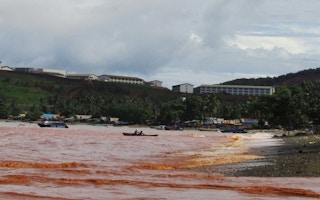Yoksan Jurumudi came home with a long face after spending the whole day looking for fish in the waters off the Obi Islands in Indonesia’s North Maluku province. The fisherman dumped out his catch, but it was only enough to feed his own family. There was nothing left over that could be sold, let alone shared with his extended family.
The days when the fishermen of Obi Island would land a bounty of skipjack tuna have long passed, they say. It now takes them at least three days of fishing, venturing increasingly farther out to sea on their small wooden ketinting canoes, to bring back just 10 kilograms (22 pounds) of tuna.
“It’s certainly harder now to look for fish in the Kawasi Sea,” Yoksan, referring to the main fishing area in the region, told Mongabay Indonesia in an interview last September.
Like many other local fishers, Yoksan blames the disappearance of the fish in the waters around the Obi Islands on the expansion of the nickel industry. First came the mines, in 2007, followed since then by smelters that refine the metal into battery-grade quality. During that time, locals say, there’s also been an undeniable degradation of the environment in and around the Obi Islands.
“I’m now over 50 years old, so I know very well the situation with the marine fish,” fisherman Umar Dahada told Mongabay Indonesia. “When it’s the rainy season, the sea turns red. I can’t fish there.”
The 42 islands that make up the Obi archipelago are part of eastern Indonesia’s famed “spice islands.” For centuries they produced mainly cloves, nutmeg and pepper. They’re also home to a rich diversity of marine life, sitting inside the Pacific Coral Triangle.
But in addition to spices and biodiversity, the Obi Islands are also rich in minerals, including gold and coal, but principally nickel. The metal is in high demand for use in electric vehicle batteries, and prices recently hit an 11-year high on supply concerns.
Indonesia is the world’s top nickel producer, with the government pushing for increased mining and refining. That includes in the Obi Islands, where national and provincial authorities, in a show of support for the industry, approved in 2019 a request by mining company PT Trimegah Bangun Persada to dump 6 million tonnes of waste into the ocean each year.
Known as deep-sea tailings disposal (DSTD), this type of dumping is already practiced by copper and gold miners in Indonesia — with devastating impacts on local ecosystems, activists say.
The approval of Trimegah’s DSTD plan inflamed existing concerns about environmental damage in the Obi Islands, and prompted fishers and environmental activists to stage several protests outside the North Maluku governor’s office and the local branch of Trimegah’s parent company, the Harita Group.
The company eventually backed down in the face of the protests, cancelling the DSTD plan; however, the North Maluku government has not yet officially revoked its approval. Anie Rahmi, a spokeswoman for Harita’s nickel division, told Mongabay Indonesia in a statement that the group’s mining activities complied with all environmental protection standards imposed by the government.
Trimegah, in its search for somewhere else to dump its waste, last July submitted a request to clear a forest on the main island of Obi to build a tailings dam. Environmental activists say this isn’t any better than the DSTD plan, given that the potential discharge of contaminated waste from the facility could pollute the surrounding ecosystem and eventually make its way to the sea.
“In addition, heavy metal dissolution by rain and oxidation by air may expand the extent of the pollution,” said Ahmad Rusydi Rasjid, executive director of the North Maluku chapter of Walhi, Indonesia’s biggest environmental NGO.
But even as Trimegah awaits approval for its proposed tailings dam, research reportedly funded in part by the company itself shows that mining and smelting activity have already polluted the fishing grounds around the Obi Islands.
The 2019 study by scientists at North Maluku’s Khairun University, which was never published, indicates that levels of heavy metals associated with nickel mining are higher than normal off the southern coast of the main island. It also found traces of these heavy metals in at least 12 marine species, including saltwater clams, mangrove snappers, oxeye herrings, and yellow-striped trevallies.
“My presumption is simply that the Kawasi Sea isn’t suitable anymore for wildlife … It’s turned into a mud puddle,” said Muhammad Aris, a co-author of the study and marine biologist at Khairun University.
“So if the fishermen say they can’t find fish anymore, that’s because they’re gone,” he added. “When the environment is already damaged, there’s nothing that humans can do.”
Aris also warned against eating fish harvested from the polluted waters.
“The people of Obi Island could die … from eating the contaminated fish,” he said. “Does it have to take a high mortality rate or mass fish die-off to realise this? We must be aware now and not let it happen.”
This story was published with permission from Mongabay.com.

















